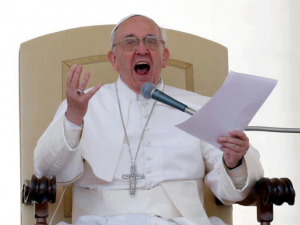
By Dan Cirucci | Dan Cirucci’s Blogspot
Well, here we go again.
Some of our non-Catholic friends (and even more than a few of our Catholic friends) have been asking us: “Isn’t the Pope infallible when he speaks via an encyclical and doesn’t his encyclical on climate change (or what used to be called global warming) carry the same weight as Church doctrine?”
It’s a good question — sort of.
 Certainly, an encyclical from the Pope is a major document. It’s an official letter expounding the position of the Vicar of Christ. Such documents are not issued lightly.
Certainly, an encyclical from the Pope is a major document. It’s an official letter expounding the position of the Vicar of Christ. Such documents are not issued lightly.
Encyclicals indicate high Papal priority for an issue at a given time. Pontiffs define when, and under which circumstances, encyclicals should be issued.
But tradition and Catholic teaching tells us that the Pope is said to be absolutely authoritative in such encyclicals when he speaks on matters of faith and morals. These are matters relating directly to good and evil, sinfulness and Godliness, right and wrong. In such circumstances, the Pope is the final word such as our own Supreme Court is the final word on matters relating to the law and the Constitution.
However, in his current encyclical the Pope has chosen to take on a wide-ranging, general societal matter — one that may or may not be scientific and one that is most assuredly political in nature. In the realm of good and evil, this is a bit of a stretch,
For example, it’s wise and practical to recycle, but if you don’t recycle is that a sin?
And, by extension are you acting in a sinful manner if you buy a gas-guzzling vehicle or if you support automobile companies that still make cars that run on carbon fuel? Are those companies acting in a sinful manner by continuing to market and sell such vehicles?
To carry this to its logical conclusion, we would have to ask: “Is consumerism itself a sin?”
Can you see where this is going?
If, by consuming (and specifically consuming more than we need or even buying products we don’t need) we are hurting poor people in distant lands, does that really become what the Church calls “an occasion of sin” or is it even “the near occasion of sin”?
Yes, we suppose that Popes have spoken before on more general societal matters in encyclicals — but never quite like this and hardly with a subject that is unsettled scientifically and subject to ongoing political debate.
Pope John XXIII issued the great encyclical Pacem in Terris dealing with war and peace in the nuclear age. It was a landmark document that dealt with a chilling and very real, very well-established threat — the threat of nuclear annihilation. At the time it was issued, we were in the middle of the Cold War and had come to the nuclear brink. All of this related to faith and Church doctrine. The Church has always taught that war is wrong. War is evil. As has often been said: “War is hell.”
No one questions the Pope’s authority to speak absolutely to the faithful on the matter of war and peace just as we would not want him to shy away from speaking on a matter of life and death such as abortion or a matter of good and evil such as genocide. These are clearly and directly matters of faith and morals.
When the Pope speaks in this way he must speak on a matter of morality that directly relates to the faith and the faithful, for the faithful remain the prime audience for the encyclical. In such situations, an encyclical can clarify matters for the faithful and (based on faith) guide them in the right direction.
But “climate change” is something that seems to have a new name (and a new theory) every day. And those who have predicted that worldwide environmental calamity would occur by the beginning of this century (if not earlier) have already been proved wrong.
We can only speculate as to why the Pope chose to make this his first encyclical and why it’s been given such primacy.
With all of the problems that the world faces today and all of the legitimate matters of faith and morals that the Pope could have spoken on (think about that for a moment) you have to ask yourself: “Why this and why now?”
_______



By making a statement like this on climate change or like it was called before temperatures were found not to be going up global warming, the Pope is diminishing the moral authority of his position He is becoming just another politician who wants to expand government control. Very sad.
Even Gov. Christie agrees human activity contributes to #climatechange. http://www.marketwatch.com/story/no-1-reason-popes-climate-encyclical-scares-gop-big-oil-far-right-and-super-rich-2015-06-13?page=1
Raised as a Catholic, and schooled in Catholic schools, I find this Pope disturbing. He has been embracing a one world government and a world faith. He and the Catholic church for that matter, have seem to lost their way, on so many levels.
Why? Because it all comes back to greed.
NJ State Senator Steve Sweeney, Union Organizer at House of Pancakes, Flip-Flop, Flip-Flop
Some good points here, including the main argument, by George Weigel in National Review.
http://www.nationalreview.com/article/419933/parsing-popes-ecology-encyclical-its-about-lot-more-climate-change-george-weigel